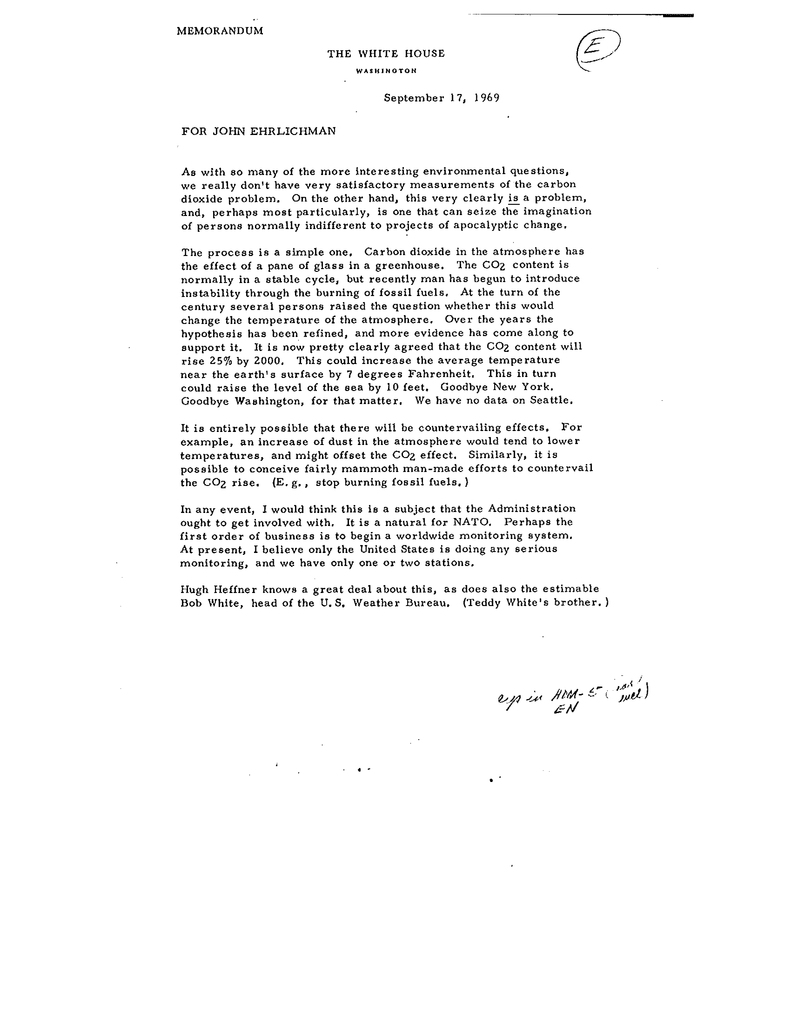Before the culture wars transformed the environment into a political hot button, it remained possible to have rational discussions about impending threats to the planet. On September 17, 1969, President Nixon’s advisor and future Democratic senator Daniel Patrick Moynihan wrote to John Ehrlichman, Nixon’s Chief Domestic Policy Advisor, about “the carbon dioxide problem.”
The environmental movement was bipartisan and ascendant in that moment. Then as now, the United States reeled from news that an oil spill — at the time the worst in the nation’s history — off Santa Barbara, California had despoiled the Pacific Coast.

Just a few months after Moynihan sent his note to Ehrlichamn, the disembodied head of ecologist Barry Commoner floated on the cover of Time Magazine above the caption, “The Emerging Science of Survival.”

And the first Earth Day would take place later that spring. The same Time cover that featured Commoner measured the winds of change and declared, “Environment: Nixon’s New Issue.” The president would soon boast some of the strongest environmental credentials of any chief executive since Theodore Roosevelt. In 1970 alone, Nixon would soon sign into law the National Environmental Policy Act and the Clean Air Act, and help to create the Environmental Protection Agency.
Moynihan, then, wrote to Ehrlichman as an ally rather than an opponent.
Acknowledging that there was as yet no accurate way to measure carbon in the atmosphere, Moynihan nevertheless suggested: “this very clearly is a problem…one that can seize the imagination of persons normally indifferent to projects of apocalyptic change.” Ever the technocrat, Moynihan then explained how carbon dioxide could change the climate, warning that, if left unchecked, it might “raise the level of the sea by 10 feet. Goodbye to New York. Goodbye Washington, for that matter.” He suggested that “fairly mammoth man-made efforts” could “countervail the CO2 rise. (E.g., stop burning fossil fuels.)”
We can only wonder what might have happened had cooler heads prevailed.







“Not with a bang, but a whimper.” Sad that the human race may have survived discovery of the atom bomb, only to die slowly and painfully from global warming.
The human race is not going to die out from global warming. Which is not to say it won’t be extremely bad if the worse scenarios come to pass, given that most major cities are on the coast, but it’s nothing like nuclear war. Hell, 55 million years ago the Earth was much warmer, there were no polar ice caps, and mammal diversity was higher than it’s ever been.
Yet we appear to be within the sixth great extinction. Global warming is one of the contributing factors that make humankind’s future precarious.
Moynihan was a technocrat on par with some of the great minds of Roosevelt’s Brain Trust. Unfortunately he came along at a time during the great unraveling when Pat Buchanan was whispering in Nixon’s ear and John Ehrlichman was probably driving a muscle car.
“Hugh Heffner knows a lot about this.” I thought his interests were rather different…